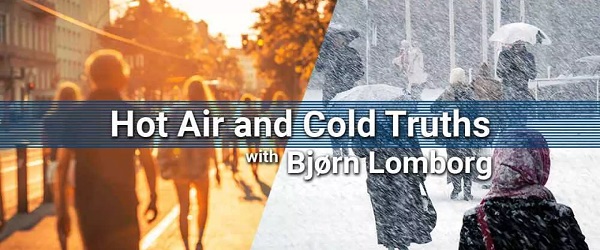Censorship Industrial Complex
Misinformed: Hyped heat deaths and ignored cold deaths

From the Fraser Institute
Whenever there’s a heatwave—whether at home or abroad—the media loves to splash it. Politicians and campaigners then jump in to warn that climate change is at fault, and urge us to cut carbon emissions. But they are only telling us one-tenth of the story and giving terrible advice.
Global warming indeed causes more heat waves, and these raise the risk that more people die because of heat. That much is true. But higher temperatures also cause a reduction in cold temperatures, reducing the risk that people die from the cold. Almost everywhere in the world—not just Canada—cold kills 5-15 times more people than heat.
Heat gets a lot of attention both because of its obvious link to climate change and because it is immediately visible—meaning it is photogenic for the media. Heat kills within a few days of temperatures getting too high, because it alters the fluid and electrolytic balance in weaker, often older people.
Cold, on the other hand, slowly kills over months. At low temperatures, the body constricts outer blood vessels to conserve heat, driving up blood pressure. High blood pressure is the world’s leading killer, causing 19 per cent of all deaths.
Depending on where we live, taking into account infrastructure like heating and cooling, along with vehicles and clothes to keep us comfortable, there is a temperature at which deaths will be at a minimum. If it gets warmer or colder, more people will die.
A recent Lancet study shows that if we count all the additional deaths from too-hot temperatures globally, heat kills nearly half a million people each year. But too-cold temperatures are more than nine-times deadlier, killing over 4.5 million people.
In Canada, unsurprisingly, cold is even deadlier, killing more than 12 times more than heat. Each year, about 1,400 Canadians die from heat, but more than 17,000 die because of the cold.
Every time there is a heatwave, climate activists will tell you that global warming is an existential problem and we need to switch to renewables. And yes, the terrible heat dome in BC in June 2021 tragically killed 450-600 people and was likely made worse by global warming. But in that same year, the cold in BC killed 2,500 people, yet these deaths made few headlines.
Moreover, the advice from climate activists—that we should hasten the switch away from fossil fuels—is deeply problematic. Switching to renewables drives up energy prices. How do people better survive heat? With air conditioning. Over the last century, despite the temperature increasing, the US saw a remarkable drop in heat deaths because of more air conditioning. Making electricity for air conditioning more expensive means especially poorer people cannot afford to stay cool, and more people die.
Likewise, access to more heating has made our homes less deadly in winter, driving down cold mortality over the 20th century. One study shows that cheap gas heating in the late 2000s saved 12,500 Americans from dying of cold each year. Making heating more expensive will consign at least 12,500 people to die each year because they can no longer afford to keep warm.
One thing climate campaigners never admit is that current temperature rises actually make fewer people die overall from heat and cold. While rising temperatures drive more heat deaths, they also reduce the number of cold deaths — and because cold deaths are much more prevalent, this reduces total deaths significantly.
The only global estimate shows that in the last two decades, rising temperatures have increased heat deaths by 0.21 percentage points but reduced cold deaths by 0.51 percentage points. Rising temperatures have reduced net global death by 0.3 per cent, meaning some 166,000 deaths have been avoided. The researchers haven’t done the numbers for Canada alone, but combined with the US, increased temperatures have caused an extra 5,000 heat deaths annually, but reduced the number of cold deaths by 14,000.

If temperatures keep rising, cold deaths can only be reduced so much. Eventually, of course, total deaths will increase again. But a new near-global Nature study shows that, looking only at the impact of climate change, the number of total dead from heat and cold will stay lower than today almost up to a 3oC temperature increase, which is more than currently expected by the end of the century.
People claim that we will soon be in a world that is literally too hot and humid to live in, using something called the “wet bulb” temperature. But under realistic assumptions, the actual number of people who by century’s end will live in unlivable circumstances is still zero.
The incessant focus on tens or hundreds of people dying in for instance Indian heatwaves makes us forget that even in India, cold is a much bigger challenge. While heat kills 89,000 people each year, cold kills seven times more at 632,000 every year. Yet, you would never know with the current climate information we get.
Hearing only the alarmist side of heat and cold deaths not only scares people—especially younger generations—but points us toward ineffective policies that drive up energy costs and let more people die from lack of adequate protection against both heat and cold.
Bjørn Lomborg
Censorship Industrial Complex
UK Government “Resist” Program Monitors Citizens’ Online Posts

Alberta
Alberta bill would protect freedom of expression for doctors, nurses, other professionals

From LifeSiteNews
‘Peterson’s law,’ named for Canadian psychologist Jordan Peterson, was introduced by Alberta Premier Danielle Smith.
Alberta’s Conservative government introduced a new law that will set “clear expectations” for professional regulatory bodies to respect freedom of speech on social media and online for doctors, nurses, engineers, and other professionals.
The new law, named “Peterson’s law” after Canadian psychologist Jordan Peterson, who was canceled by his regulatory body, was introduced Thursday by Alberta Premier Danielle Smith.
“Professionals should never fear losing their license or career because of a social media post, an interview, or a personal opinion expressed on their own time,” Smith said in a press release sent to media and LifeSiteNews.
“Alberta’s government is restoring fairness and neutrality so regulators focus on competence and ethics, not policing beliefs. Every Albertan has the right to speak freely without ideological enforcement or intimidation, and this legislation makes that protection real.”
The law, known as Bill 13, the Regulated Professions Neutrality Act, will “set clear expectations for professional regulatory bodies to ensure professionals’ right to free expression is protected.”
According to the government, the new law will “Limit professional regulatory bodies from disciplining professionals for expressive off-duty conduct, except in specific circumstances such as threats of physical violence or a criminal conviction.”
It will also restrict mandatory training “unrelated to competence or ethics, such as diversity, equity, and inclusion training.”
Bill 13, once it becomes law, which is all but guaranteed as Smith’s United Conservative Party (UCP) holds a majority, will also “create principles of neutrality that prohibit professional regulatory bodies from assigning value, blame or different treatment to individuals based on personally held views or political beliefs.”
As reported by LifeSiteNews, Peterson has been embattled with the College of Psychologists of Ontario (CPO) after it mandated he undergo social media “training” to keep his license following posts he made on X, formerly Twitter, criticizing Trudeau and LGBT activists.
He recently noted how the CPO offered him a deal to “be bought,” in which the legal fees owed to them after losing his court challenge could be waived but only if he agreed to quit his job as a psychologist.
Early this year, LifeSiteNews reported that the CPO had selected Peterson’s “re-education coach” for having publicly opposed the LGBT agenda.
The Alberta government directly referenced Peterson’s (who is from Alberta originally) plight with the CPO, noting “the disciplinary proceedings against Dr. Jordan Peterson by the College of Psychologists of Ontario, demonstrate how regulatory bodies can extend their reach into personal expression rather than professional competence.”
“Similar cases involving nurses, engineers and other professionals revealed a growing pattern: individuals facing investigations, penalties or compulsory ideological training for off-duty expressive conduct. These incidents became a catalyst, confirming the need for clear legislative boundaries that protect free expression while preserving professional standards.”
Alberta Minister of Justice and Attorney General Mickey Amery said regarding Bill 13 that the new law makes that protection of professionals “real and holds professional regulatory bodies to a clear standard.”
Last year, Peterson formally announced his departure from Canada in favor of moving to the United States, saying his birth nation has become a “totalitarian hell hole.”
-

 Alberta2 days ago
Alberta2 days agoNet Zero goal is a fundamental flaw in the Ottawa-Alberta MOU
-

 Food2 days ago
Food2 days agoCanada Still Serves Up Food Dyes The FDA Has Banned
-

 National2 days ago
National2 days agoEco-radical Canadian Cabinet minister resigns after oil deal approved
-

 Alberta1 day ago
Alberta1 day agoKeynote address of Premier Danielle Smith at 2025 UCP AGM
-

 Artificial Intelligence1 day ago
Artificial Intelligence1 day ago‘Trouble in Toyland’ report sounds alarm on AI toys
-

 Addictions2 days ago
Addictions2 days agoManitoba Is Doubling Down On A Failed Drug Policy
-

 COVID-191 day ago
COVID-191 day agoThe dangers of mRNA vaccines explained by Dr. John Campbell
-

 COVID-192 days ago
COVID-192 days agoFDA says COVID shots ‘killed’ at least 10 children, promises new vaccine safeguards











